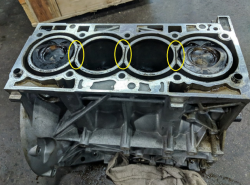
— Ford EcoBoost problems have caused a class action lawsuit that alleges 1.5-liter, 1.6-liter and 2-liter EcoBoost engines allow coolant to leak into the cylinders.
According to the lawsuit, these Ford and Lincoln vehicles allegedly suffer from cracked cylinder heads, inadequate seals and total EcoBoost engine failures.
- 2013-2019 Ford Escape
- 2013-2019 Ford Fusion
- 2015-2018 Ford Edge
- 2017-2019 Lincoln MKC
- 2017-2019 Lincoln MKZ
One of the plaintiffs who sued says he purchased a used 2016 Ford Edge in March 2018 when the SUV had 36,376 miles on the odometer. But in November 2020 and with about 65,000 miles on the vehicle, the plaintiff says the EcoBoost engine warning light illuminated and convinced the owner to take the Edge to a Colorado repair shop.
The technician “SCAN[NED] COMPUTER FOR TROUBLE CODESP0303, P0316 (MISFIRES)” and said the “ENGINE COOLANT WAS ALSO LOW.”
“Test fuel and ignition systems for misfires. Perform block test, and pressure test cooling system to inspect for possible coolant in cylinders. Coolant is leaking into cylinder #3 and block test indicates combustion gases in cooling system. Long block assembly may need to be replaced per Ford service bulletin.” - Ford Edge repair order
The plaintiff says he was advised to take the SUV to a Ford dealership and was charged $189.00 for the diagnostic work.
The EcoBoost lawsuit says a Ford technician determined the engine needed to be replaced for $10,000, then decreased the replacement cost to $7,178.62.
The plaintiff allegedly contacted Ford’s corporate customer service department and requested reimbursement or a discount for the replacement of the EcoBoost engine, but Ford allegedly refused to cover any of the cost. The Ford EcoBoost problems allegedly have never been repaired.
Owners who report Ford EcoBoost problems claim the coolant enters the cylinders and causes corrosion, oil dilution and contamination, leading to engine damage and expensive repairs.
The alleged defects have existed since the vehicles were first sold, something Ford allegedly knew but concealed from consumers since 2010. The automaker has allegedly failed to provide EcoBoost owners with proper solutions and only offers "temporary stop-gap remedies such as installing coolant level sensors."
According to the class action, the sensors allegedly alert drivers when the coolant is gone, but the sensors allegedly do nothing to prevent coolant from leaking into the EcoBoost engine cylinders.
Ford EcoBoost problems also allegedly cause owners thousands of dollars for repairs and replacements that must be performed to drive the vehicles.
Service Bulletins About Ford EcoBoost Problems
Ford issued multiple technical service bulletins (TSBs) and other service messages for vehicles equipped with EcoBoost engines, something the plaintiffs claim proves the automaker knows about the alleged Lincoln and Ford EcoBoost problems.
- SSM 47204 – 2015-2018 Fusion/MKZ/MKC/Escape/Edge
- SSM 47462 – 2015-2018 Edge, Fusion, Focus, MKZ, MKC, Escape
- SSM 47625 – 2014-2019 Fusion and 2017-2019 Escape
- SSM 47849 – 2014-2019 Fusion and 2017-2019 Escape
- TSB 19-2375 – 2017-2019 Escape; 2014-2019 Fusion
- TSB 19-2346 – 2015-2018 Edge; 2017-2019 Escape, Fusion; 2017-2019 MKC, MKZ
- TSB 19B37-S1 – 2017-2019 Escape, Fusion
- TSB 20-2100 – 2014-2019 Fusion, 2017-2019 Escape
- TSB 19B37-S3 – 2017-2019 Fusion, Escape
- SSM 48991 – 2015-2020 F-150/Edge/Fusion, 2016-2018 MKX, 2019-2020 Nautilus, 2017-2020 Continental
According to the Ford EcoBoost class action lawsuit, the engines have inadequate seals on the cylinder heads and grooves where the cylinder heads attach to the engine blocks. Coolant allegedly enters through the grooves where it pools and degrades the gasket seals and causes coolant to leak into the cylinders.
The Ford EcoBoost class action lawsuit was filed in the U.S. District Court for the District of Delaware: Reed, et al., v. Ford Motor Company.
The plaintiffs are represented by Berger Montague PC, and Capstone Law APC.




